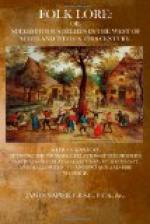The gods of the Greeks were numbered by thousands, and this at a time when—according to classical scholars—the arts and sciences were at their highest point of development in that nation. Their religion was of the grossest nature. Whatever conception they may have had of a first cause—a most high Creator of heaven and earth—it is evident they did not believe he took anything to do directly with man or the phenomena of nature; but that these were under the immediate control of deputy-deities or of a conclave of divinities, who possessed both divine and human attributes—having human appetites, passions, and affections. Some of these were local deities, others provincial, others national, and others again phenomenal: every human emotion, passion and affection, every social circumstance, public or private, was under the control or guardianship of one or more of these divinities, who claimed from men suitable honour and worship, the omission of which honour and worship was considered to be not only offensive to the divinities, but as likely to be followed by punishment. The vengeance of the deities was thought to be avertable by the performance of certain propitiatory deeds, or by offering certain sacrifices. The kind of sacrifice required had relation to the particular department over which the divinity was supposed to be guardian; and these deeds and sacrifices were in many cases most gross and offensive to morality. The phenomena of nature, being under the direction of one or more divinities, every aspect of nature was regarded as an expression of anger or pleasure on the part of the divinities. Thunder, lightning, eclipses, comets, drought, floods, storms—anything strange or terrible, the cause of which was not understood, was ascribed to the wrath of some divinity; and men hastened to propitiate, as best they might, the divinities who were supposed to be scourging or threatening them. These deputy-gods were supposed to occupy the space between the earth and moon, and, being almost numberless and invisible, their worshippers held them in the same dread as if they possessed the attribute of omniscience.
For the purpose of guiding men in their relations towards these gods, there existed a large body of men whose office it was to understand the divinities, their natures and attributes, and direct men in their religious duties. This body of men acted as mediums between the gods and the people, and not only were they held in high esteem as priests, but frequently they attained great power in the State. Often this priestly incorporation had greater influence and control than the civil power; nor is this to be wondered at, when we remember that they were supposed to be in direct communication with the holy gods, in whose hands were the destinies of men.




